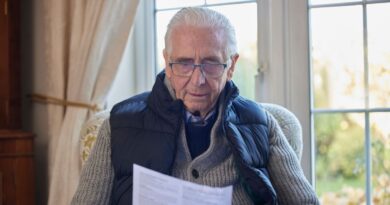State pension warning as millions could be slapped with ‘retirement tax’ within two years | Personal Finance | Finance
State pensioners in the UK are being warned that they could soon be hit with a “retirement tax”.
Experts are warning that fiscal drag could see Britons dragged into higher tax brackets as Prime Minister Keir Starmer vows to keep tax thresholds frozen until 2027-28. The freeze was brought in by the previous Conservative government.
With the personal savings allowance to remain at £12,570, fiscal drag could bring more people into higher tax brackets.
Researchers warn that wage growth will raise the state pension past the personal savings allowance threshold by April 2026, meaning pensioners would pay tax of 20 percent on every £1 over the £12,570 threshold from the state pension payments.
State pensions rise every year with the highest of the following: Average earnings rise, inflation, or by 2.5 percent, a system known as the Triple Lock, which Labour has vowed to keep in place.
This week, the Office for National Statistics (ONS) found that wages jumped up by an average of 5.7 percent between March and May.
Former pensions minister Sir Steve Webb said the current pensions system as a “mess” and that older people an expect to feel the effect of fiscal drag.
He said: “If all you’ve got is the state pension then you don’t have to fill in a tax return.
“However, it does seem bizarre for the Government to pay the state pension with one hand and then collect very small amounts of tax with the other – the bureaucracy and hassle for citizens makes it pointless.
“The new government should say: if a pensioner only has a regular state pension then they shouldn’t pay tax on it. It’s just a mess, one that more people will be dragged into if this is allowed to happen.”
An HM Treasury spokesperson said: “Older people should be able to live with the dignity and respect they deserve, and the state pension is the foundation for this.
“We are committed to the triple lock, and pensioners whose sole income is the new state pension and who have not deferred or received protected payments do not pay any income tax.”





